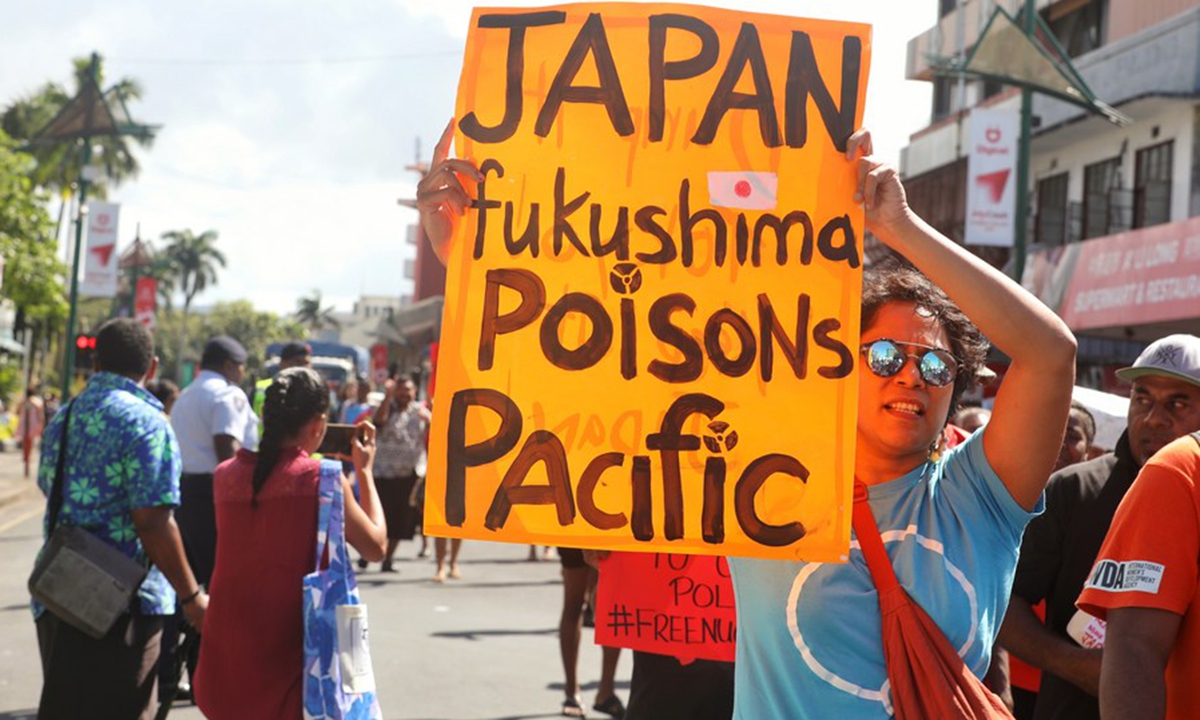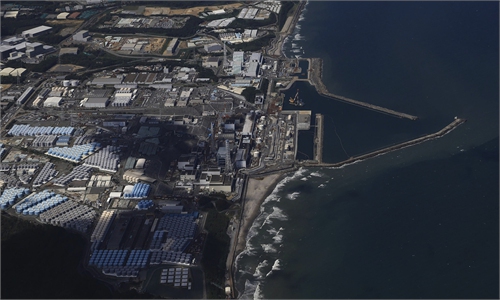Japanese govt, media hype Chinese fury over contaminated water dumping in bid to shift attention, portray itself as ‘victim’

People attend a rally against Japan's dumping of nuke wastewater in Suva, Fiji, Aug. 25, 2023. (Photo by Sang Qinlong/Xinhua)
The Japanese government, which arbitrarily started dumping nuclear-contaminated wastewater into the sea recently, is employing a combination of PR stunts at home and abroad in a bid to shift attention, create antagonism and turn itself from the culprit risking the global health and environment into an innocent victim of Chinese public opinion attacks by hyping Chinese fury over the dumping.
Echoing the Japanese government and media, the US-led Western camp also took their media outlets to the frontline in highlighting the so-called anti-Japan sentiment growing in China, exaggerating the moves of a few Chinese citizens, including nuisance phone calls to Japanese enterprises and authorities.
While stressing that certain inappropriate actions by individual Chinese citizens are not encouraged and most Chinese people remain rational over the issue and follow the basic principle of protecting their health from potential nuclear contamination, Chinese experts pointed out that Japan is conducting the environmental terrorism incident and risks the future of the world, and asked how it dared to blame China over the reaction.
In response to a Japanese reporter's claims that Japanese in China are worried that the Chinese are becoming more active in "anti-Japanese" actions, Wang Wenbin, spokesperson for the Chinese Foreign Ministry, said at a press briefing on Monday that China always protects the safety and legitimate rights and interests of foreign nationals in China in accordance with law.
Wang's remarks came after Japanese and some Western media outlets including Kyodo News, Reuters and BBC started hyping the harassing calls from China over Fukushima nuclear-contaminated water dumping.
"A lot of harassing phone calls believed to be originating from China are occurring in Japan ... These developments are extremely regrettable and we are concerned," Chief Cabinet Secretary Hirokazu Matsuno, the chief government spokesperson, told a regular news conference, Reuters reported on Monday.
Also, Kyodo News cited Japanese government sources as saying on Monday that a rock was thrown into the grounds of a Japanese school in Qingdao, East China's Shandong Province last Thursday, when the contaminated water discharge began, while eggs were hurled Friday at another Japanese school in Suzhou, East China's Jiangsu Province. Nobody was hurt in those incidents.
Chinese observers said that after being challenged by Tokyo's reckless move, which sparked real-life "Godzilla fears" around the world, some people felt helpless and powerless to reverse it, letting off steam by engaging in some inappropriate behavior. But observers pointed out those were individual cases that were not encouraged by mainstream Chinese public opinion or the authorities.
Observers also warned of some false rumors among the cases. For example, Xi'an police in Northwest China's Shaanxi Province on Monday denied online rumors claiming that residents driving Japanese-made cars have been stopped and had their cars smashed.
Japan is trying to portray itself as a victim by exaggerating the expressions of dissatisfaction among some Chinese citizens and using it to divert the attention of the international community from its extremely irresponsible dumping, said Liu Jiangyong, vice dean of the Institute of Modern International Relations at Tsinghua University.
"We should really be on the alert for Japan's skilled and well-managed PR stunts that attempt to make a false countercharge against the Chinese side," Liu told the Global Times on Monday.
The Japanese Ministry of Foreign Affairs launched a policy to strengthen countermeasures against so-called "disinformation" over the contaminated water dumping by increasing its 2024 budget specially designed to respond to "disinformation" to approximately 70 billion yen ($478 million), NHK reported Thursday when Japan started the dumping process.
The Global Times also found out previously that Japan spends a great deal of money on PR efforts overseas to win more endorsements for dumping nuclear-contaminated wastewater into the sea.
Wu Jianghao, the Chinese ambassador in Japan, lodged solemn representations on the disruption suffered by the Chinese embassies and consulates in Japan on Monday, saying that they have received a large number of harassing phone calls from Japan recently, which has seriously disrupted their normal operation.
According to a Monday statement by the Chinese Embassy in Japan, Wu said that China will continue to protect the safety of its embassy and consulates in Japan and the legitimate rights and interests of Chinese citizens in accordance with law. At the same time, the Japanese side should correctly guide public opinion, stop hyping up related issues, and refrain from trying to divert the focus of the incident and cover up its wrongful act of dumping contaminated water into the sea.
Western double-standards exposed
Meanwhile, China's reasonable response, including suspension of Japanese aquatic products out of concern for its people's safety and environment, has been smeared by some Western media.
German media outlet Frankfurter Allgemeine Zeitung (FAZ) on Thursday slammed China's criticism of Japan's move as hypocritical, saying China should exercise restraint in its criticism.
Imagine if a certain European country dumped nuclear-contaminated wastewater into the Mediterranean or into the English Channel, would other European countries be happy about that and support it? Liu asked, warning that their attitude will reap consequences eventually when the nuclear contamination spreads to their seawater.
Liu condemned those Western media outlets and authorities that always crowed about environmental protection and human rights, but have kept silent on the potential impact and harm by Japan's behavior.
The Japanese public also showed its outrage over the dumping process. Japanese Prime Minister Fumio Kishida's cabinet has seen its approval rating drop to 26 percent, showed a new poll by Japanese media outlet Mainichi Shimbun on Sunday, leaving it in "dangerous waters" below 30 percent for the second month in a row.
Wang Wenbin also cited concern and opposition in Japan over the Fukushima nuclear-contaminated water disposal, "according to a Japanese poll, about 40 percent of the people surveyed oppose the plan, 88.1 percent are worried that it will damage Japan's image and potential economic benefits, and 81.9 percent think that the Japanese government's explanation is insufficient."
Chiyo Oda, representative of Japanese environmental NGO "Stop polluting the oceans!" told the Global Times that as a citizen of Fukushima Prefecture, she found that most locals are very upset about Tokyo's dumping actions, adding that Japanese consumers are nervous as well.
She noted that despite strong opposition from the Pacific islands nations and other coastal nations, the Japanese government and media only put their focus on concern from China and South Korea. "We hope to unite with more countries to oppose the dumping," Oda said.
Denise Yoon, director of the policy department of the Korea Federation of Environmental Movement - a South Korean NGO - told the Global Times on Monday that a global campaign team will organize global candlelight rallies against Japan's dumping move in New York, Los Angeles, Tokyo, Seoul, Sydney, Berlin, London, and Manila on September 26 during the UN General Assembly.


